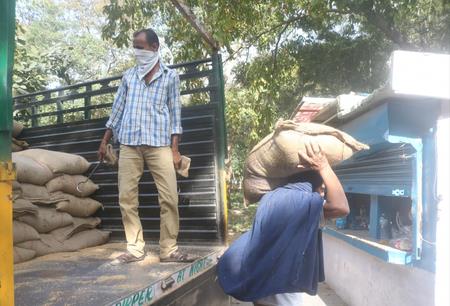
TN Ration Shop Staff Struggle With 'Inadequate' Funds For Essential Commodities' Deliveries
The Cooperative Department's allocation for distribution expenses, they say, falls far short of actual costs, forcing workers to personally bear the burden required to keep the system functioning.
Under the current norms, the department provides Rs 36 per ration card in urban areas, Rs 40 in rural areas, and Rs 100 in hill regions.
However, supervisors pointed out that these allocations do not match the expenditure involved in delivering essential commodities to beneficiaries' homes.
Hiring mini-load vans alone costs around Rs 2,000 per day in many localities, while the amount sanctioned for an average shop is significantly lower.
For a shop with over 40 Thayumanavar Scheme cardholders, the total allocation often amounts to less than Rs 2,000, leaving staff with no option but to absorb the shortfall. Operational challenges compound the financial strain.
Bluetooth-enabled weighing machines used during delivery frequently malfunction due to poor connectivity, restricting staff visiting only 15–20 beneficiaries a day.
The expansion of eligibility, from people aged 70 and above to those aged 65 and above, has increased the number of households requiring service, while changes in distribution dates have added confusion among both staff and beneficiaries.
In rural areas, lack of internet access makes biometric authentication difficult, particularly for individuals living alone in remote locations.
Workers say that many beneficiaries are unable to make cash payments for any additional requirements when digital networks fail, forcing them to revisit households or defer deliveries.
The physical demands of the scheme are also taking a toll. Workers regularly climb multiple flights of stairs in buildings without lifts, assist bedridden individuals, and make repeated visits when households are locked.
Fatigue and illness often follow after covering more than 20 households in a single day, yet staff are expected to reach far larger clusters.
While senior officials insist that the existing allocation is adequate and that workers can reach up to 70 beneficiaries in a day, frontline staff maintain that ground realities tell a different story.
They argue that without a revision of delivery allowances and improved operational support, the scheme's objective of providing dignified doorstep service to vulnerable groups will continue to place an unsustainable burden on ration shop employees across the state.

Legal Disclaimer:
MENAFN provides the
information “as is” without warranty of any kind. We do not accept
any responsibility or liability for the accuracy, content, images,
videos, licenses, completeness, legality, or reliability of the information
contained in this article. If you have any complaints or copyright
issues related to this article, kindly contact the provider above.


















Comments
No comment